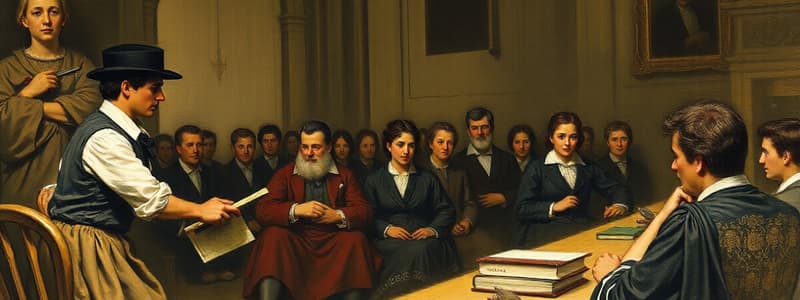Podcast
Questions and Answers
What does Tom Robinson testify about his interactions with Mayella Ewell?
What does Tom Robinson testify about his interactions with Mayella Ewell?
Tom Robinson testifies that Mayella Ewell asked him to come into the house to fix a door, and he did so. He says she then asked him to help chop up a piece of wood for her, and they both worked on it together. He also mentions that she seemed friendly initially, but her demeanor changed once her father came home and she told her father that Tom had tried to rape her.
How does Tom Robinson explain why he ran away from the Ewell house?
How does Tom Robinson explain why he ran away from the Ewell house?
Tom Robinson explains that he ran away from the Ewell house because he was scared. He says he thought Bob Ewell was going to shoot him and that he felt threatened because Bob Ewell had a reputation for violence.
What reason does Tom give for always helping Mayella without accepting payment?
What reason does Tom give for always helping Mayella without accepting payment?
Tom Robinson explains that he helped Mayella out of kindness and because he felt sorry for her, as she seemed to live a difficult life. He says he didn't think she was malicious, but he did note that she was struggling financially. He adds that he never expected payment for the help he offered.
Why is Tom’s statement that he felt sorry for Mayella significant in the courtroom?
Why is Tom’s statement that he felt sorry for Mayella significant in the courtroom?
How does Mr. Gilmer, the prosecutor, treat Tom during his cross-examination?
How does Mr. Gilmer, the prosecutor, treat Tom during his cross-examination?
What advice does Dolphus Raymond give to Scout and Dill outside the courthouse?
What advice does Dolphus Raymond give to Scout and Dill outside the courthouse?
What lesson does Scout learn from Dolphus Raymond's perspective on society?
What lesson does Scout learn from Dolphus Raymond's perspective on society?
How does Atticus appeal to the jury in his closing argument?
How does Atticus appeal to the jury in his closing argument?
Why does Atticus say the case is as simple as “black and white”?
Why does Atticus say the case is as simple as “black and white”?
How does Dill react to Mr. Gilmer’s treatment of Tom Robinson, and why?
How does Dill react to Mr. Gilmer’s treatment of Tom Robinson, and why?
How does Mayella Ewell behave when she takes the witness stand?
How does Mayella Ewell behave when she takes the witness stand?
What does Mayella claim happened on the day of the alleged incident?
What does Mayella claim happened on the day of the alleged incident?
How does Atticus treat Mayella during his cross-examination?
How does Atticus treat Mayella during his cross-examination?
What does Mayella reveal about her home life during the questioning?
What does Mayella reveal about her home life during the questioning?
How does Mayella react to Atticus’s polite manner of addressing her, such as calling her “maʼam”?
How does Mayella react to Atticus’s polite manner of addressing her, such as calling her “maʼam”?
What key point does Atticus raise about Mayella’s injuries?
What key point does Atticus raise about Mayella’s injuries?
What does Mayella’s hesitation and evasive answers suggest during the cross-examination?
What does Mayella’s hesitation and evasive answers suggest during the cross-examination?
How does the courtroom react to Mayella’s testimony?
How does the courtroom react to Mayella’s testimony?
Why does Mayella become upset and refuse to answer certain questions?
Why does Mayella become upset and refuse to answer certain questions?
What does Mayella’s testimony reveal about the themes of the book?
What does Mayella’s testimony reveal about the themes of the book?
Flashcards
Tom’s Testimony
Tom’s Testimony
Tom Robinson, a black man, describes his encounters with Mayella Ewell, a white woman. He claims he helped her with chores around her house but never had any romantic or inappropriate relationship with her.
Tom’s Escape
Tom’s Escape
When questioned about fleeing the Ewell house, Tom explains he ran away because he feared Mayella’s father, Bob Ewell, would find out about his interaction with Mayella and accuse him of something inappropriate.
Tom's Motivation
Tom's Motivation
Tom asserts that he always helped Mayella without receiving any compensation because he genuinely felt sympathy for her and her family’s dire situation.
Tom’s Pity
Tom’s Pity
Signup and view all the flashcards
Mr. Gilmer's Conduct
Mr. Gilmer's Conduct
Signup and view all the flashcards
Dolphus Raymond's Advice
Dolphus Raymond's Advice
Signup and view all the flashcards
Scout's Lesson
Scout's Lesson
Signup and view all the flashcards
Atticus's Closing Argument
Atticus's Closing Argument
Signup and view all the flashcards
Black and White
Black and White
Signup and view all the flashcards
Dill’s Reaction
Dill’s Reaction
Signup and view all the flashcards
Mayella's Demeanor
Mayella's Demeanor
Signup and view all the flashcards
Mayella’s Claim
Mayella’s Claim
Signup and view all the flashcards
Atticus’s Cross-Examination
Atticus’s Cross-Examination
Signup and view all the flashcards
Mayella's Home Life
Mayella's Home Life
Signup and view all the flashcards
Mayella's Reaction to Politeness
Mayella's Reaction to Politeness
Signup and view all the flashcards
Atticus's Point About Injuries
Atticus's Point About Injuries
Signup and view all the flashcards
Mayella's Hesitation
Mayella's Hesitation
Signup and view all the flashcards
Courtroom Reaction
Courtroom Reaction
Signup and view all the flashcards
Mayella's Upset
Mayella's Upset
Signup and view all the flashcards
Mayella's Testimony and Themes
Mayella's Testimony and Themes
Signup and view all the flashcards
Study Notes
Tom Robinson's Testimony
- Tom Robinson describes his interactions with Mayella Ewell
- He explains running away from the Ewell house
- He states that he consistently aided Mayella without payment
Tom's Statement Significance
- Tom's statement expressing remorse for Mayella is crucial in the courtroom.
Mr. Gilmer's Cross-Examination
- Mr. Gilmer's treatment of Tom during cross-examination is aggressive.
Dolphus Raymond's Advice
- Dolphus Raymond provides Scout and Dill with external viewpoints on society during their visit to the courthouse.
Scout's Lesson
- Scout gains perspective on society through Dolphus Raymond's guidance.
Atticus's Closing Argument
- Atticus simplifies the case as black and white.
Dill's Reaction to Mr. Gilmer's Treatment
- Dill reacts strongly to Mr. Gilmer's offensive treatment of Tom Robinson.
Mayella Ewell's Testimony
- Mayella displays erratic behavior while on the witness stand
- She recounts an alleged incident
- Atticus conducts the cross-examination, revealing details about her home life.
- Mayella exhibits an inconsistent, strained response when Atticus addresses her politely.
Mayella's Injuries
- Mayella mentions her injuries.
Courtroom Reaction to Mayella's Testimony
- The courtroom's reaction to Mayella's testimony conveys its sentiment during the cross-examination.
Mayella's Upset and Refusal to Answer
- Upset, Mayella avoids responding to certain questions.
Themes of the Book Reflected in Mayella's Testimony
- Mayella's testimony highlights themes explored in the book.
Studying That Suits You
Use AI to generate personalized quizzes and flashcards to suit your learning preferences.
Related Documents
Description
Dive into the key moments of Tom Robinson's testimony and understand its significance in the trial. Explore the perspectives of various characters, including Atticus Finch and Scout, as they navigate the complexities of justice and society. This quiz will test your knowledge on the relevant courtroom interactions depicted in 'To Kill a Mockingbird'.





